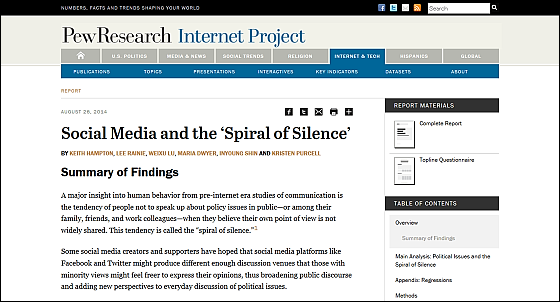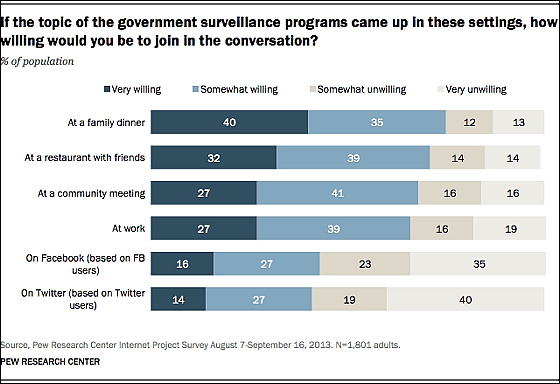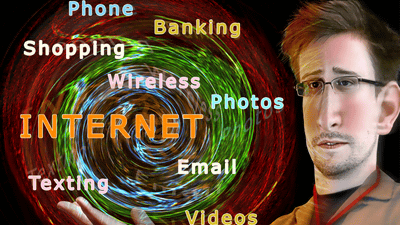Is SNS a platform that can freely express minority opinions?

ByKara Harms
A theory of hypothesis that minorities become less likely to make their own opinions by forming public opinion that is regarded as a majority in mass media and becoming pressure "Silence spiralHowever, the statistical result that this theory has the same effect on SNS such as Twitter and Facebook is a think tank which investigates information on people's problem awareness, opinions, tendenciesPew InstituteIt is announced in.
Social Media and the 'Spiral of Silence' | Pew Research Center's Internet & amp; American Life Project
http://www.pewinternet.org/2014/08/26/social-media-and-the-spiral-of-silence/

Before the Internet was born, people tend not to want to discuss minority opinion of political problems with public places, family, friends, colleagues, this tendency is called "spiral of silence" It is. As a result of the popularization of the Internet, SNS founder members can easily send out their own opinions such as SNS to all over the world, and SNS founder hoped that platform like Facebook and Twitter will be a free forum for discussion is. The free opinion of minority opinion frees the possibility of a new prospect of political problems, but the Pew Research Institute conducts research and research on politics debate in SNS for 1801 adults Did.
Mr. Edward Snowden was exposed to the theme chosen as a themeUS National Security AgencyIt is a citizen's surveillance problem by NSA. According to the investigation by Pew Research Institute, 44% answered "hurt" and 49% answered "useful" to the question "How does exposure of confidential information affect public interest?" The reason was that people 's opinion was divided.
This survey inquired about "Where do you want to discuss NSA exposure problems?" As a result, up to 75% of Americans would like to speak face to face about the surveillance program, but only 43% showed willingness to post opinions on SNS about the same problem from SNS It turns out that there are many people who wish to discuss in face to face.

Also, about 14% who replied "I do not want to discuss NSA face-to-face", only 0.3% wanted "discussion on SNS". Also, if you look at only SNS users, they tend to be less motivated to share their opinions face-to-face, and if they are "opinions that are likely to be denied by followers" they will be reluctant to discuss further. Average Facebook users who use SNS more than a few times a day do not want to discuss about half of face-to-face discussions with friends and people who wish to discuss at a restaurant as a forum for exchanging views.

ByAmarois
Taken together, we can conclude that the minority opinion on SNS is hard to say and that SNS is not a platform for exchanging free opinions that can overcome "spiral of silence". In addition, Pew Research Institute not only refrains from opinion on the online, if the followers feel that the follower is opposed to their opinion, in fact, opinions on similar arguments to friends, family and colleagues I will predict that I will refrain from it.
The survey also gained an answer on the media that knew the NSA's exposure problem, 58% TV or radio, 34% online excluding SNS, 31% friends or family, 19% newspaper, Facebook To 15%, from Twitter it was 3%. Although it was talked about something about the NSA problem, that did not increase access to SNS, and at the same time SNS was not used as a news media.
Related Posts:
in Note, Web Service, Posted by darkhorse_log







